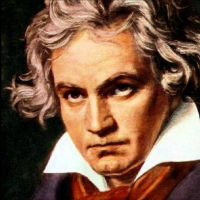Beethoven's Fidelio (first version 1805) is nominally set in Spain and features an aristocrat, imprisoned by another
aristocrat, rescued by the heroism of his wife, and finally freed by a minister of the King—yet it pulses with the spirit of
revolution, and echoes to the cry of Liberty. After exploring the paradox of Beethoven's only opera, we will glance at one
or more later operas that use the prison setting to plead passionate humanitarian points: Janacek's From the House of the
Dead (1930), Jake Heggie's Dead Man Walking (2000), Thierry Escaich's Claude (2013), and/or David Lang's
Prisoner of the State (2019), a reworking of the plot of Fidelio.
Brief synopses of the Beethoven and Janacek operas are included in the handouts.
For five-minute introductions to the music of each opera, I recommend the following, both from British companies:
Fidelio (Glyndebourne), and
From the House of the Dead (Opera North). rb.
The two major productions shown in class are available complete on YouTube, although neither has English titles. For a
complete Fidelio with titles, you have a choice between the old Leonard Bernstein version from Vienna, whose titles
are color-coded and terribly intrusive, or a new production from the Paris Opéra Comique set in a modern hi-tech
prison. I cannot find an English-titled House of the Dead anywhere. I also added a brief clip from a fine student
production of Jake Heggie's Dead Man Walking, another contemporary opera with a prison setting that I
did not have time to get to. *Asterisks indicate items not played in class. rb.
| BEETHOVEN: FIDELIO |
| |
NY Met, 2002 |
|
* Prisoners' chorus
(all links are to the complete opera)
* Act I finale
* Grave-digging duet
* Dungeon quartet
* Act II finale
|
| |
Vienna, 1978 |
|
* Complete opera
(old video with obtrusive titles)
|
| |
Paris, 2022 |
|
* Complete opera
(updated production; English titles)
|
| |
Hamburg, 2018 |
|
* Trailer
(a very unusual approach!)
|
| |
Glyndebourne, 2021 |
|
* A musical introduction
|
| |
| JANACECK: FROM THE HOUSE OF THE DEAD |
| |
Aix-en-Provence, 2007 |
|
* Entrance of Grojancikov
(complete opera; French titles only)
* End of Act I, start of Act II
* End of Act II
* Start of Act III
* End of Act III
|
| |
Brussels/London, 2018 |
|
* Trailer
(very short trailer of the Warlikowski production)
|
| |
Opera North, 2011 |
|
* A musical introduction
|
| |
| OTHER OPERAS MENTIONED |
| |
Heggie: Dead Man Walking |
|
* Boston Conservatory
(students, but excellent video and diction)
|
| |
Eschaich: Claude |
|
* Scene 3
(scene shown in class, but no titles)
|
| |
Lang: Prisoner of the State |
|
* Soprano aria, with piano
* Trailer, with orchestra
(NY Philharmonic)
|
| |
|
|
|
|
|
| IMAGES |
The thumbnails below cover the slides shown in class. Click the
thumbnail to see a larger image.
Click on the right or left of this picture to go forward or back,
or outside the border to close. |
 | |
 | |
 | |
 | |
 | |
 | |
 | |
 | |
 | |
 | |
 | |
 | |
The class contains work by the following composers, given here in chronological order.
For bios of other composers in the course, click here.
 |
Ludwig van Beethoven (1771–1827). German composer.
Indisputably the greatest composer of his time, Beethoven revolutionized every genre he touched: the symphony,
the string quartet, the instrumental sonata, and many others. But he made only one foray into opera, with
Fidelio (originally called Leonore) which he labored on in several versions between 1805 and 1814.
It is the only opera of the first decade of the century still in the standard repertoire.
|
 |
Thierry Escaich (b.1965). French organist and composer.
Like the late Olivier Messaien, Escaich holds a post as organist at one of the principal churches in Paris, while
maintaining a career composing works for other medium. His first opera Claude, based on a story by Victor
Hugo, premiered in 2011 at the Opéra de Lyon, to critical acclaim for its emotional intensity.
|
 |
Jake Heggie (b.1961). American composer.
Heggie came to fame as an opera composer in 2000, with his adaptation of Dead Man Walking by Sister Helen
Prejean, who appears as a character in the opera. He went on to write an operatic version of Moby Dick (2010),
a dramatically impressive condensation of Melville's huge book, to great critical acclaim.
|
 |
Leoš Janácek (1854–1928). Czech composer.
Janácek turned to opera fairly late in his career, but his half-dozen mature works in the medium place him in the
forefront of opera composers of the 20th century, not only for their distinctive musical style but also their
unusual structure and dramatic innovation. Among them are: Jenufa (1903), Káta Kabanová (1921), The
Cunning Little Vixen (1923), The Makropoulos Affair (1925), and From the House of the Dead (1928).
|
 |
David Lang (b.1957). American composer.
Born in Los Angeles, but now living and working in New York, Lang was a co-founder of the musical collective
Bang on a Can. In 1908, he was awarded the Pulitzer Prize for Music for The Little Match Girl Passion,
a retelling of the Andersen story using the structure of a Bach Passion.
|

















